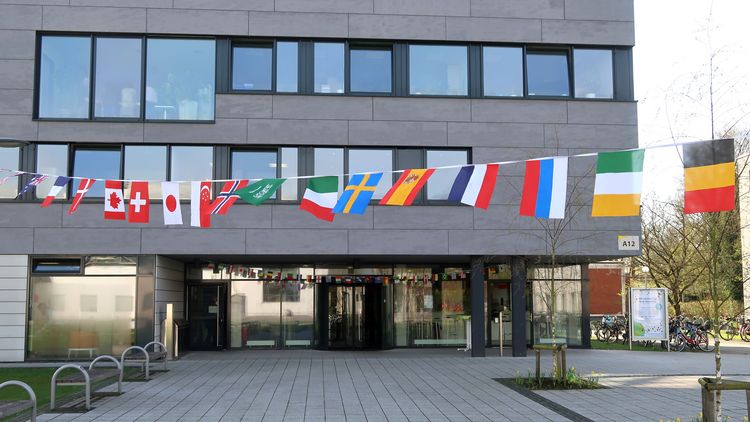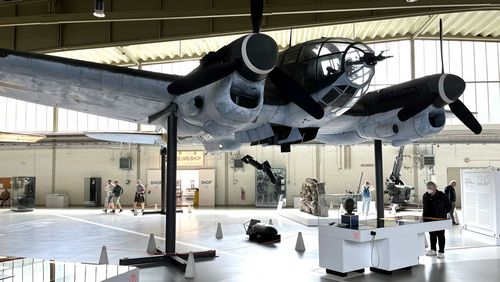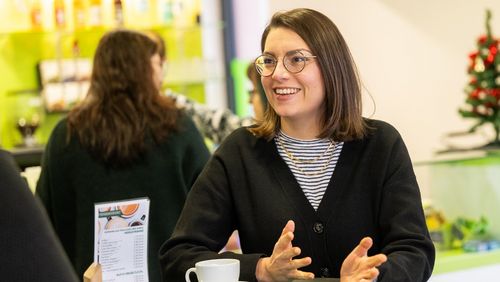Researchers from around the world
The University of Oldenburg is international! Here we introduce people from all over the world who have chosen to come to Oldenburg. The following academics are guests at our university to conduct research on various topics.
Hongyan Bao
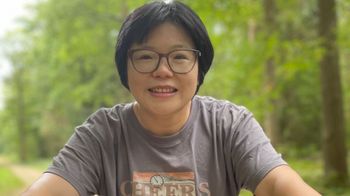
I’ve chosen to work at the University of Oldenburg because of my host Prof. Dr Thorsten Dittmar and his research group. I have been collaborating with Thorsten Dittmar for a long time and I like how well we communicate. The state-of-the-art lab facilities and the professional technicians here in Oldenburg make my work much easier and more efficient. The group members are really friendly, and I enjoy every discussion with them.
I’m currently working on the cycling of organic matter between land, air and ocean. There are tens of thousands of types of invisible organic molecules in natural waters which are very difficult to characterize. Thanks to the instruments here at the University of Oldenburg, we are able to look at the composition of natural organic matter in very fine detail. We are trying to use organic matter to reveal the consequences of global changes – such as changes in land usage, air pollution or sewage discharge – on the environment and climate.
What I particularly like about my stay here are the friendly people, both at my work and in everyday life in the city. I brought my whole family with me. My kids go to kindergarten and school here, and even though they cannot speak German, all the teachers are super friendly to them. I also like the city, which is so bicycle-friendly. There is still quite a lot to explore, so I am looking forward to the coming days and months.
Hanin Karawani Khoury
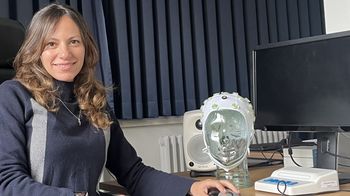
I’ve chosen to work at the University of Oldenburg because I am delighted to work with my host, Prof. Esther Ruigendijk, and her team and colleagues at this University and the Cluster of Excellence Hearing4All. They belong to the international top in the field of auditory and cognitive neuroscience and psycholinguistic research and use innovative neural techniques that will definitely add to my expertise in brain plasticity and auditory processing.
I’m currently working on a critical question in human behaviour, namely how long-term language experience affects an individual’s ability to process speech information in real-life listening environments. Real-world listening environments can be noisy and can obscure important speech information. These difficulties in understanding speech under background noise are even more pronounced in bilingual populations than in monolingual ones, especially when the former are processing speech in their second language. At the University of Oldenburg, we will investigate how prior language experience, including multilingualism, shapes brain function and modifies speech listening abilities.
What I particularly like about my stay here is that I can render new academic achievements in highly respected labs while at the same time I can enjoy a new chapter in my life with my family. I also enjoy the nice atmosphere of Oldenburg and Bremen and the chance to renew my German I learnt back home.
Gad Barnea
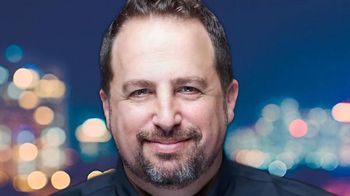
I have chosen to work at the University of Oldenburg because Professor Dr Benedikt Hensel and I are leading the cooperation between the Universities of Oldenburg and Haifa in the field of Jewish history, biblical studies and theology. In this capacity, Professor Hensel invited me to be Carl von Ossietzky Guest Lecturer for this winter semester. He and I share a vision for the future of the study of ancient Judaism in all its aspects – based on academic standards and technological innovation. We have ambitious plans for this partnership, with several ground-breaking projects underway. These include both innovations in the field of epigraphy – the study of inscriptions – for the research of the history of Judaism in the Achaemenid period (550 – 330 BC) as well as fundamental solutions for the application of Digital Humanities concepts in general.
I am currently working on a course that Professor Hensel and I are teaching simultaneously here in Oldenburg and in Haifa. It is called “Seen from the East: Judaism under the Iranian ‘Age of Empires’” and we are offering it for the first time. We are currently preparing for the second part of this course in the coming semester. In addition, I am finishing a book on my restoration of a remarkable scroll from the Dead Sea area, found among the documents retained by the Jews of Qumran. It preserves a previously unknown legend from the Achaemenid court.
What I particularly like about my stay here is that the leadership here at the University of Oldenburg is very responsive in embracing innovation and collaboration. Furthermore, the students show a keen interest in the latest advancements in research and are happy to share their own insights. This first stay here is only the first step in a promising and fruitful partnership.
Firoj Sk
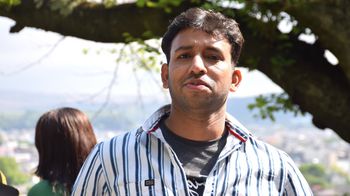
I have chosen to work at the University of Oldenburg because of my host Prof. Dr. Konstantin Pankrashkin. His research interests intersect with mine in the mathematical field of the p-Laplacian eigenvalue problems. I am happy to join his team as a Humboldt postdoctoral fellow.
I am currently working on partial differential equations. These equations are used in physics and engineering to describe a wide variety of phenomena including heat transfer, fluid dynamics, quantum mechanics and image processing. Understanding and solving partial differential equations enable advancements in these fields, leading to improved technologies, better predictions, and deeper insights into the underlying dynamics of natural and engineered systems. I investigate the p-Laplacian eigenvalue problem which is a prototype example of a nonlinear partial differential equation.
What I particularly like about my stay here is the friendly atmosphere both in the research group and in everyday interactions in the City of Oldenburg as well as at the university. The locals are really kind and helpful, especially my host. Prof. Pankrashkin has been one of the most supportive persons for me since I arrived in Oldenburg. Furthermore, I am also looking forward to getting to know German culture, traditions and language.
Kothandam Krishnamoorthy
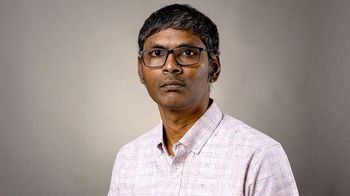
I’ve chosen to work at the University of Oldenburg mainly because of Prof. Dr Gunther Wittstock. He is a highly respected scientist and one of the scientific leaders in the area of electrochemistry. For the Humboldt application, he suggested a research area, which also led to a longstanding collaboration with the Fraunhofer-Institut für Fertigungstechnik und Angewandte Materialforschung (IFAM) in Bremen. Also, I am glad that I am associated with the university named after one of the finest journalists in history.
I’m currently working on energy storage devices. Batteries are ubiquitous in any kind of consumer electronic devices. Despite huge advances, some challenges remain in this essential field of research. For example, today most wearable electronic devices use rigid batteries while flexible energy devices are not commonly used yet. These devices have two flexible electrical conductors, that is materials converting chemical energy into electrical energy, and an electrolyte solution. We work on all these aspects of energy devices, such as electrodes and electrolytes. In some of these projects, we also collaborate with Dr. Julian Schwenzel from the IFAM.
What I particularly like about my stay here is the research environment. I have been associated with some of the finest institutions such as the Indian Institute of Technology in Bombay (India), the University of Massachusetts in Amherst (USA), and the National Chemical Laboratory in Pune (India). The research facilities of these institutions are comparable to that of the University of Oldenburg. The strengths and objectives of those institutes might be different from those of the Institute of Chemistry here in Oldenburg, but the support system at this university is unparalleled. My stay here has afforded me a unique research environment, and I really like it.
Anise Akhundi
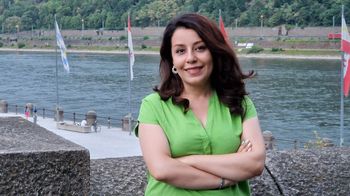
I’ve chosen to work at the University of Oldenburg since I knew about the profound background here in electro- and photocatalytic reactions and the great opportunity to broaden my experiences. As an expert in the field of photocatalysis and after years of research I could easily spot high impact work in this area around the world and the University of Oldenburg. Prof. Dr Michael Wark’s group is definitely on the list. I was happy to receive the postdoctoral research fellowship by the Alexander von Humboldt Foundation under supervision of Professor Wark and started the programme in October 2022.
I’m currently working on photocatalytic conversion of biomass to value-added chemicals using so-called metal organic frameworks (MOFs) and covalent organic frameworks (COFs) as heterogeneous photocatalysts. That means we use waste biomass as a renewable carbon source and produce – with the help of light and the catalysts – chemicals that are in turn useful for industrial purposes. Before starting my programme here at the University of Oldenburg I was doing research on almost the same topic at Sharif University of Technology in Tehran, Iran. However, my interest in this field was triggered during my stay at the University of Palermo as part of my PhD, where I performed my first relevant experiments. Photocatalytic conversion of biomass into value-added chemicals is a sustainable approach, which can be conducted at ambient temperature and pressure. This can be achieved by a comprehensive and deep understanding on the role of key parameters on activity and selectivity of photocatalysts during the process.
What I particularly like about my stay is that I can connect to a number of other researchers working at the same time in my group or even generally at the University of Oldenburg. Colleagues in the group really make my stay exciting and joyful with all the support they give and all the positive atmosphere they create. There are many interesting events, and the international community of the university is also active. This adds to the initial warm welcome. Not to forget that Oldenburg is the best place to enjoy riding a bike.
Rima Beesoo
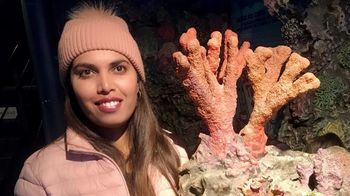
I’ve chosen to work at the University of Oldenburg because during my previous postdoctoral research at the University of Münster in 2019, I got the opportunity to carry out my field work activities in the North Sea including Wilhelmshaven and that’s how I came to know about the Institute of Chemistry and Biology of the Sea (ICBM). I was amazed by the beautiful location of the research institute, its multidisciplinary focuses, high-tech laboratories, and world class researchers such as Prof. Peter Schupp who is now my host supervisor.
I’m currently working working in collaboration with the Leibniz Centre for Tropical Marine Research (ZMT) in Bremen on the natural product chemistry and biological properties of the tropical jellyfish Cassiopea andromeda with potential application towards developing novel nutraceuticals, that is products beneficial for human health. We first screen the chemical components and bioactive properties of these jellyfish-derived extracts and compounds to find out whether they are toxic against human cancer cells and also have antioxidant effects. We culture the jellyfish at different temperatures and light conditions and observe how the molecules are involved in the metabolism change. Our study will open a fertile area of research to pursue the search for novel bioactive agents from jellyfish. Furthermore, it will also provide baseline scientific information on best and innovative practices for aquaculture and sustainable production of jellyfish biomass.
What I particularly like about my stay in Wilhelmshaven is the sea. Although it is quite different to Mauritius, somehow the smell of the sea and beaches remind me of home. Living in the guest house of the station is such a bliss especially in summer when I wake up to the beautiful view of the ocean and sometimes, I also get to see seals and whales near the shore, things I do not get to see in Mauritius! Last but not the least, coming from different parts of the world, researchers working at ICBM are outgoing, friendly, and helpful. It is also a good opportunity to learn and share our respective cultures and traditions which further adds to a great experience in Germany.
Ignacio Pedre
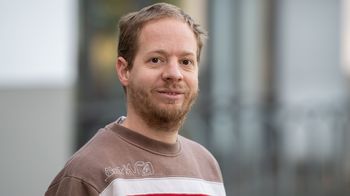
I’ve chosen to work at the University of Oldenburg because my goal is to gain experience in the field of marine chemistry, and the Institut für Chemie und Biologie des Meeres (ICBM) is an institution of excellence in that subject recognised at an international level.
I’m currently working on the development of optical sensors to measure manganese in porewater samples from the island of Spiekeroog. The basic idea is to obtain simple and easy-to-use test strips that undergo a colour change after a short immersion period in the sample. Afterwards, the colour change can be quantified and correlated to the manganese content of the sample by taking digital images of the strip and analysing them with an imaging processing software.
What I particularly like about my stay here is how nice everyone is, both in the work environment and in everyday life in general. And also, the project I am working on, which is very exciting.
Florian Carl
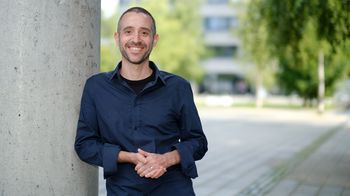
I’ve chosen to work at the University of Oldenburg because of my host, Prof. Dr. Susanne Binas-Preisendörfer, whose work overlaps with my own research interests in music and media. The geographical location of the University of Oldenburg is also ideal for my current research project, which focuses on historical documents stored at the Bremen State Archive.
I’m currently working on a social history of aurality in southeastern Ghana, investigating the significance of sound and listening in the context of missionization and colonization. One of the major European missions that was active in West Africa in the 19th century was the Norddeutsche Missionsgesellschaft, also known as Bremen Mission. From 1884 to 1916, southeastern Ghana was part of the German colony Togo. Germany and Ghana have therefore a shared historical legacy, which is particularly interesting for me as a German who lives and works in Ghana.
What I particularly like about my stay here is the support for international researchers and the welcoming atmosphere in Oldenburg. I also greatly enjoy the food here and the German weather, which is a welcome change from Ghana's tropical heat.
Miriam Reverter
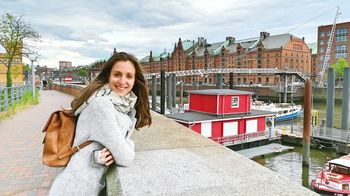
I’ve chosen to work at the University of Oldenburg to work with Professor Peter Schupp, who’s an international renowned researcher in Marine Chemical Ecology, with a large experience on Indo-Pacific coral reefs.
I’m currently working on coral reef benthic shifts, and the microbial and chemical mechanisms underlying the successful proliferation of some non-calcifying organisms such as sponges and soft corals, in the context of global change. The proliferation of such organisms is increasingly observed in coral reefs and poses serious threats to the structural complexity and persistence of coral reefs. However, the mechanisms that might allow these organisms to thrive and kill hard corals remain poorly understood.
What I particularly like here is the numerous research sources available, the positive and supporting environment within the research group and the freedom to pursue my own research interests. Regarding Wilhelmshaven, my favourite place is the Banter See. It’s the perfect place to go and relax after work in a sunny afternoon.
Hangyong Shan
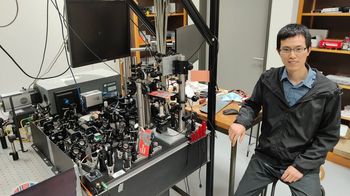
I’ve chosen to work at the University of Oldenburg because of my supervisor Christian Schneider. When I was a PhD student at Peking University, my research projects were in close relation with his papers, so I read many of his literatures. I found his research was advanced and novel, and I thought it would be great if I had an opportunity to join his group.
I’m currently working on light emission of exciton-polaritons at room temperature. We try to realize room-temperature Bose condensate and lasing on basis of atomically thin semiconductors, which could be an advanced process in this field, especially for the practical device operation, as low-temperature is a requisite usually.
What I particularly like about my stay here is the motivated and free academic atmosphere, as well as the excellent research conditions. Also, Oldenburg and the Uni are peaceful and harmonious. I believe it’s a nice place for study and research.
Lena Magnone
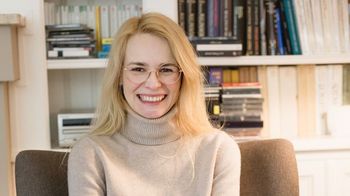
I’ve chosen to work at the University of Oldenburg because I spent a few days here in April 2018 on the occasion of a conference organized by Prof. Gun-Britt Kohler. I was delighted by the warm welcome at the University and genuinely charmed by the town of Oldenburg. On my way home, I was already checking the Humboldt Foundation website and planning to come back!
I’m currently working on the project 'Transnational Female Modernism in Central Europe at the turn of the 19th and 20th century', that should eventually result in a book-length study. The idea originated from my collaboration with Prof. Kohler, who inspired me to remove women modernists from national contexts and to perceive their works not as a minor or major contribution to any of the local ‘young’ movements, but a separate historical and literary phenomenon, with its own chronology and dynamics.
What I particularly like about my stay here is that I really enjoy Oldenburg's biking culture! Before coming here, I was only an occasional cyclist. Now I am very fond of my pink bicycle borrowed from the University's workshop, which I ride rain or shine. In my free time, I like to explore the beautiful surroundings, also on the bike. Campus Wechloy, where I live, is an excellent starting point for many excursions.
Mandana Amiri
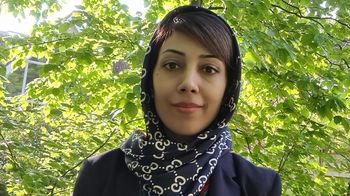
I’ve chosen to work at the University of Oldenburg because I would like to widen my horizon and broaden my expertise and research network. I obtained a DAAD scholarship and visited the University of Oldenburg in 2016. The university has several high-tech facilities and accomplished scientists. I have been cooperating remotely with Prof. Dr Michael Wark since then. But now it was time to collaborate face-to-face.
I’m currently working on electrochemical water splitting using metal organic frameworks (MOFs). There is great attention on hydrogen gas as a potential energy source. At present, hydrogen is mainly produced from fossil resources through a steam reforming process. This accelerates fossil fuel depletion and CO2 emission. In view of environmental issues, splitting of water into oxygen and hydrogen gas during water electrolysis is a clean alternative to generate hydrogen with high purity. We are going to design and prepare some so-called metal-organic frameworks (MOFs) as electrocatalysts or supports of electrocatalysts to obtain better performance. Most of my activity will be in Prof. Dr. Michael Wark`s lab at the Institute of Chemistry.
What I particularly like about my stay here is that Oldenburg is a very pretty and peaceful city with very helpful people. It has a good university with high-tech facilities, a beautiful campus and a warm welcoming to internationals. Truly, for a scientist who is interested to work in a scientific and calm atmosphere, University of Oldenburg is one of the best options. The previous exceptional experiences in social and academic life in Oldenburg encouraged me to apply for a longer research stay, twelve months, here. Germany always makes me think of discipline, rules, hard-work, international atmosphere and beautiful nature!
Topics
- Astronomy
- Biology
- Botanical garden
- Chemistry
- Computing Science
- Cooperations
- Covid
- Culture
- Dutch Studies
- Early Career
- Economics
- Educational Sciences
- Energy
- Energy Research
- Environmental Sciences
- Equal opportunities
- German Studies
- Graduate academy
- Health Services Research
- Higher Education Policy
- History
- Human Medicine
- International affairs
- Marine Sciences
- Material Culture
- Medical ethics
- Medical Physics and Acoustics
- Music
- Neuroscience
- People
- Philosophy
- Physics
- Presidential Board
- Psychology
- Research
- Slavic Studies
- Social Sciences
- Special Needs Education
- Sport Science
- Study Affairs
- Sustainability
- Teacher Education
- Theology
- Transfer
- University Medicine
- Ukraine
- Wind Physics

